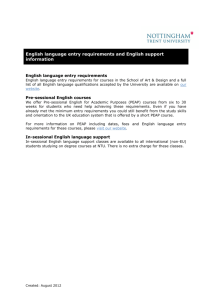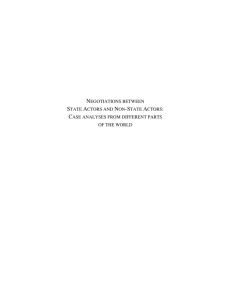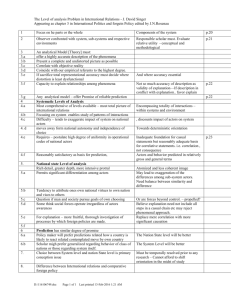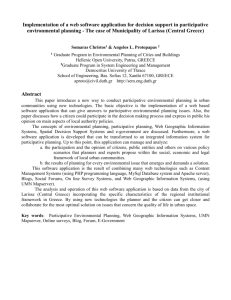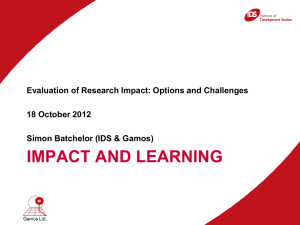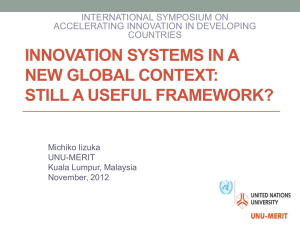PPT Scope of Work for Participative (Local) Economic Action
advertisement
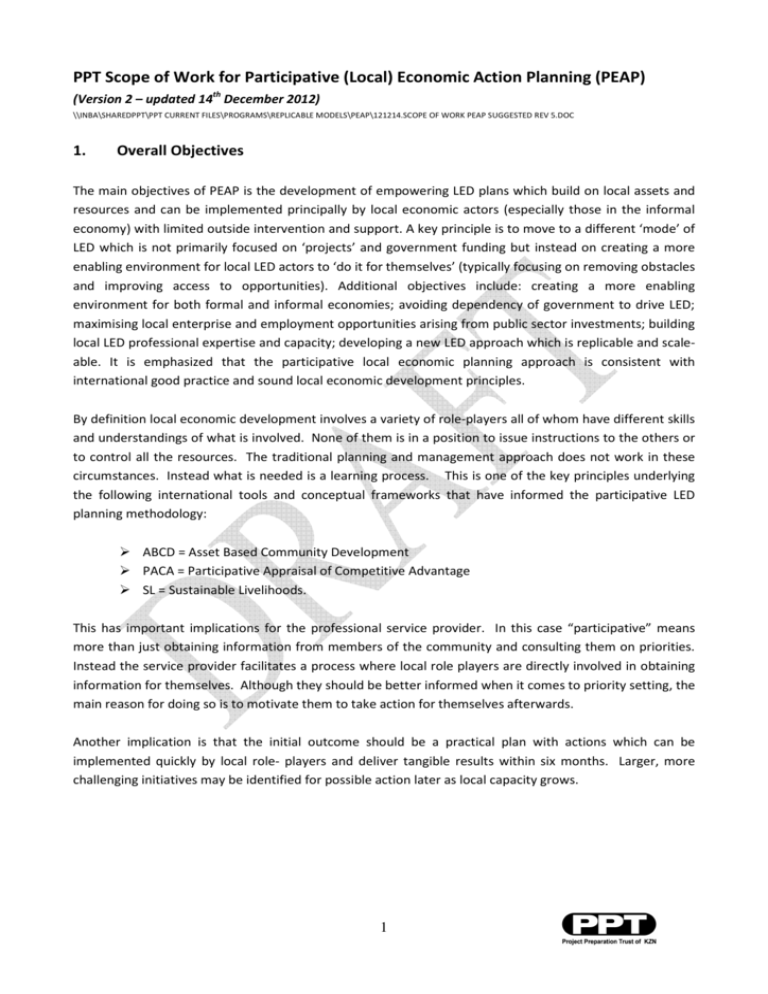
PPT Scope of Work for Participative (Local) Economic Action Planning (PEAP) (Version 2 – updated 14th December 2012) \\INBA\SHAREDPPT\PPT CURRENT FILES\PROGRAMS\REPLICABLE MODELS\PEAP\121214.SCOPE OF WORK PEAP SUGGESTED REV 5.DOC 1. Overall Objectives The main objectives of PEAP is the development of empowering LED plans which build on local assets and resources and can be implemented principally by local economic actors (especially those in the informal economy) with limited outside intervention and support. A key principle is to move to a different ‘mode’ of LED which is not primarily focused on ‘projects’ and government funding but instead on creating a more enabling environment for local LED actors to ‘do it for themselves’ (typically focusing on removing obstacles and improving access to opportunities). Additional objectives include: creating a more enabling environment for both formal and informal economies; avoiding dependency of government to drive LED; maximising local enterprise and employment opportunities arising from public sector investments; building local LED professional expertise and capacity; developing a new LED approach which is replicable and scaleable. It is emphasized that the participative local economic planning approach is consistent with international good practice and sound local economic development principles. By definition local economic development involves a variety of role-players all of whom have different skills and understandings of what is involved. None of them is in a position to issue instructions to the others or to control all the resources. The traditional planning and management approach does not work in these circumstances. Instead what is needed is a learning process. This is one of the key principles underlying the following international tools and conceptual frameworks that have informed the participative LED planning methodology: ABCD = Asset Based Community Development PACA = Participative Appraisal of Competitive Advantage SL = Sustainable Livelihoods. This has important implications for the professional service provider. In this case “participative” means more than just obtaining information from members of the community and consulting them on priorities. Instead the service provider facilitates a process where local role players are directly involved in obtaining information for themselves. Although they should be better informed when it comes to priority setting, the main reason for doing so is to motivate them to take action for themselves afterwards. Another implication is that the initial outcome should be a practical plan with actions which can be implemented quickly by local role- players and deliver tangible results within six months. Larger, more challenging initiatives may be identified for possible action later as local capacity grows. 1 2. Scope of Work 2.1. Set-up: Obtain and assess relevant base information (see section 3 below). Identification of local role-players (main sectors, interest groups, local economic actors). Establish communications with them. Obtain buy-in from key leadership and ‘gate-keepers’ (e.g. councilors, amakhosi etc.). Establish communications with key municipal personnel (e.g. assigned community development worker, regional community coordinator). 2.2. Start-up workshop: This serves to make introductions, to confirm or consolidate local buy-in, and to explain to local economic ‘actors’ and other role-players what the PEAP process is and is not as well as the roles and responsibilities of all concerned. It is when the process of identifying key interest groups and economic activities is begun and when participants are moblised into small action teams to begin making an inventory of local assets and opportunities. 2.3. Information gathering (including workshops): There are several elements to this as follows: • The action teams formed at the start-up workshop ‘map’ the local area / economy in respect of local assets (i.e. skills, associations, institutions, economic activities) and key opportunities. • An information workshop is held to monitor the progress being made by the information gathering teams and to map the local economy further, e.g. using the ‘leaky bucket’ analogy. Additional specific interest groups and action teams may established at this time. • Mini-workshops are held for specific interest groups or ‘sectors’ (e.g., retailers, service businesses, small scale growers, contractors, financial associations such as stokvels, etc.). In these workshops, people discover and understand common issues and opportunities through a facilitated process. • Additional information is obtained by interviewing key individuals. • Other activities such as a ‘transect walk’ may be useful. It is noted that in some instances engaging with or including specific personnel from relevant municipal/government departments may be appropriate. 2.4. Prioritisation workshop: All participants in the process take part in a workshop to review the findings from the process of gathering information and consider how to make use of local assets and opportunities to develop the local economy. A list of practical, “doable” activities capable of yielding practical outcomes in six months is identified. Small local teams (usually of three of four people) are formed to take the process forward into action. 2.5. Organising and action planning: With the help of a facilitator each of the small action teams referred to in 2.4 above meets to clarify their goals and develop a practical 30-day action plan which is regularly reviewed and revised every 30 days . This continues for approximately 6 months after which overall progress in producing local change is reviewed. It may be useful for representatives of each of the teams to meet from time to time share information and address any common problems that might arise. Defined actions must be realistic and achieve-able. Whilst the focus is on local economic actors taking responsibility and driving change, the process naturally includes engagement with external actors and government and might assist in guiding the supportive investments and actions taken by them (e.g. investment in economic infrastructure, enabling local 2 contractors opportunities on municipal infrastructure construction etc.). 2.6. Follow through support (e.g. mentorship or coaching): As outlined above, support is provided by the professional facilitator to the organizing teams. This is required in order to assist them in implementing plans (i.e. progress monitoring, assisting them to understand problems / obstacles and solve them, providing feedback, where appropriate playing a facilitative role in overcoming challenges). A key principle is to capacitate and empower local actors through the follow through support process. 2.7. Six month review and report back: After approximately six months all the teams should take part in a collective review of progress to identify what has been achieved, what has been learned and what should be done next. The outcome is shared and a meeting of all the participants in earlier process with a view to obtaining fresh priorities and establishing new action teams where appropriate. 3. Output / product For each PEAP undertaken, the following reports will be required: 3.1. A written record of all meetings and workshops held including: a summary of all key issues discussed and decisions made; attendance registers. 3.2. A short overview report on the main characteristics of the local area / neighbourhood, main economic actors, sectors, opportunities, recommendations to government (and other external support agents) as to priority actions it can take in concert with local economic actors to promote and enable LED including any key strategic LED investment opportunities. 3.3. Practical action plans for each identified sector or group engaged with. It is emphasized that these plans need to be realistic and achieve-able within existing capacity and other resource constraints. Whilst they might include some level of government investment, this should not be the foundation of the plans. 3.4. A report on the mentorship and follow through undertaken including any successes realized, challenges experienced, and additional actions which could be taken (both by local economic actors or by government in support of them). 4. Base information It is important the service providers refer to available and relevant base information pertaining to the local area such as: • IDP, • SDP / SDF, • Zone, ward and other local boundaries, • Any local economic development plans or frameworks, • Provincial Growth Development Strategy (where available), • Locality of existing informal settlements, 3 5. • Relevant sector plans (e.g. Housing Sector Plan), • Ward profiles (where available), • Social facility node hierarchy (where available), • Any relevant master plans such as those pertaining to roads, public transport or precinct redevelopment (where available). • Reports and surveys on key businesses and industries in and around the area. Professional skills and experience required The required experience and skill required relate principally to: a) community participation and engagement; b) informal and micro-enterprise development; c) local-level urban economies; d) understanding of and responsiveness to the principles contained in section 1 ‘Context’. Conventional planning skills (e.g. relating to land use management planning or IDP’s) are not regarded as directly relevant or necessary. A sound understanding of participatory process is critical and in particular how to enable participants to explore issues themselves and reach their own conclusions (and even to learn through ‘mistakes’). Experience with methods like PACA1, participative value chain analysis, sustainable livelihoods, and asset based community development is an advantage. There may be advantages in the process being undertaken by two professionals with complementary skills. This also makes managing participative workshops easier. Fluency in the prevailing local language is critical as is an understanding of (or ability to work within and adapt to) local community dynamics, local cultural traditions and protocols, and local politics. 6. Budget / Cost The required budget may vary depending on such factors as locality, area size, extent of local economic activity, number of local stakeholders who need to be engaged etc. Typically a budget of between R60,000 and R100,000 is required for one local area / neighbourhood. 7. Timeframes Completion of participative sector / theme planning workshops within and submission of associated report within eight weeks. Completion of full scope of work scope of work including follow through support and mentorship within four to six months. 1 Participative Appraisal of Competitive Advantage as developed by Mesopartner and promoted in South Africa by GTZ. 4
